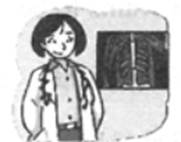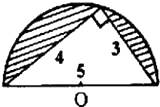五年级试题
①母亲掏衣兜,掏出一卷揉得皱皱的毛票,用龟裂的手指数着。
②旁边一个女人停止踏缝纫机,向母亲探过身,喊:“大姐,别给!没你这么当妈的!供他们吃,供他们穿,供他们上学,还供他们看闲书哇!”接着又对我喊:“你看你妈这是在怎么挣钱?你忍心朝你妈要钱买书哇?”
③母亲却已将钱塞在我手里了,大声回答那个女人:“谁叫我们是当妈的呀!我挺高兴他爱看书的!”
④母亲说完,立刻又坐了下去,立刻又弯曲了背,立刻又将头俯在缝纫机板上了,立刻又陷入手脚并用的机械忙碌状态……
⑤那一天我第一次发现,母亲原来是那么瘦小!那一天我第一次觉得自己长大了,应该是一个大人了。
-
(1) 写出下列词语的反义词。
忙碌— 瘦小— 高兴—
-
(2) 读文段中的画线句子,说说从中你体会到了什么。
-
(3) 根据选文内容填空。
第①段中,有一个词可以表现出母亲工作的艰辛,这个词是“”;对“我”买书,母亲的态度是,由此可以看出母亲。
-
(4) 从这位母亲身上,你想到的诗句是:。
Mark Twain and Train Ticket
Mark Twain was an American writer. One day he went to a city by train. He wanted to see one of his friends there. He was a very busy man. He usually forgot something.
When he was in the train, the conductor asked him for his ticket. Mark Twain looked for his ticket here and there, but he couldn't find it. The conductor knew Mark Twain. She said, "Show me your ticket on your way back. And if you can't find it, it doesn't matter"
"Oh, but it does," said Mark Twain, "I must find the ticket. If I can't find it, how can I know where I am going?"
-
(1) Mark Twain is _______________________.A . an American writer B . a Chinese writer C . an English waiter D . an American waiter
-
(2) Mark Twain went to a city to _____________________.A . go on a trip B . find something important C . see a friend D . leave home
-
(3) Did the conductor ask Mark Twain for his ticket?A . No, she didn't. B . Yes, she did. C . No, she doesn't. D . Yes, she does.
-
(4) Did Mark Twain find his ticket?A . Yes, he did. B . No, he didn't. C . Yes, he does. D . No, he doesn't.
-
(5) Mark Twain wanted to find the ticket toA . cheat the conductor B . give it to the conductor C . be an honest man D . see where to go

要求改写句子。
-
(1) 为了拖住敌人,六班的五个战士一边痛击追上来的敌人,一边有计划地撤退,把大批敌人引上狼牙山。(缩句)
-
(2) 五位壮士完成了任务。(扩句)
一阳光 一篷帐 一花苞
一白云 一草地 一蜻蜓
-
(1) 一会儿,继续又来了几个碾米的老乡,碾台又吱吱扭扭地转了起来。
。
-
(2) 我们就是全国的老百姓胜利的可靠保证。
。



 ,
,  ,
,  ,考试结束后,最容易出现几个人优秀?
,考试结束后,最容易出现几个人优秀?
2.38×( )(所得的积比2.38小)
- 今年两会上,通过了明确规定:全国人大代表名额,由全国人大常委会根据各省、自治区、直辖市的人口数,按照每一代表所代表的城乡
- 第三节:完形填空(共20小题:每小题1.5分,满分30分) 阅读下面短文,从短文所给各题的四个选项(A、B、C和D)中,
- 45.(8分)下图为高等动物细胞及细胞膜的亚显微结构模式图(局部),请据图回答:(1)细胞识别与图中的化学成分_____
- 下列不属于细胞凋亡现象的是( ) ①霜冻导致香蕉植株死亡 ②蝌蚪发育成青蛙的过程中尾部消失 ③
- 下图中,甲烧杯中盛有CuSO4溶液,乙烧杯中盛有饱和NaCl溶液。C、D、E、F四极均为石墨电极。 已知:通电一段时间后
- 一玻璃砖横截面如图所示,其中△ABC为直角三角形(AC边未画出),AB为直角边,∠ABC=45°;ADC为一圆弧,其圆心
- 将刚萎焉的菜叶放入清水中,菜叶细胞中的水分能够恢复的原因属于 A.主动吸水 B.主动运输 C.协助扩散 D
- 下图为四种不同的育种方法,分析回答: (1)图中A、D方向所示的途径表示杂交育种方式,一般从F2开始选种,这是因为
- 已知A、B、C、D和E 5种分子所含原子数目依次为1、2、3、4和6,且都含有18个电子。又知B、C和D是由两种元素的原
- .已知关于x的方程5x+3k=24与方程5x+3=0的解相同,则K的值为_________
- 下列说法正确的是 A.SARS病毒能够单独完成各种生命活动 B.细菌本身不能够单独完成各
- 请在下面一段文字中的横线处填入恰当的词语,使整段文字语意连贯,逻辑严密,层次分明。 从读大学到当老师,我跟随郭先生十几年
- 一个色盲女子与一个正常男子结婚,生下一个染色体为XXY色觉正常的儿子。则此染色体变异发生在什么之中?若父亲色盲,母亲正常
- 如图,在棱长为a的正方体ABCD—A1B1C1D1中,M、O、O1分别是A1B、AC、A1C1的中点,且OH⊥O1B,垂
- 下列历法出现的先后顺序是( )①太初历 ②大衍历 ③十二气历 ④授时历A.
- 下列反应常温时能自发进行,并既能用能量判据又能用熵判据解释的是 A.HCl(g)+NH3(g)= NH4Cl(s) B.
- 生活中常常会发生一些变化,下列变化属于化学变化的是 ( )A.在晾干的咸菜表面出现白色晶体B.给电熨
- 小英家的圆形镜子被打碎了,她拿了如图(网格中的每个小正方形边长为1)的一块碎片到玻璃店,配制成形状、大小与原来一致的镜面
- 下列关于细胞结构和功能的描述正确的是( ) A.都有由DNA和蛋白质构成的染色体 B.构成蛋白质、核酸、淀粉
- Everything comes with _____ price; there isno such _____ thi



